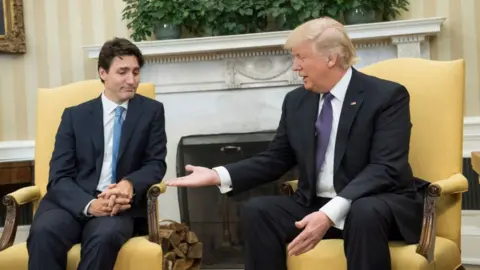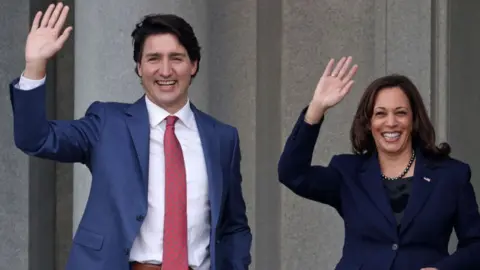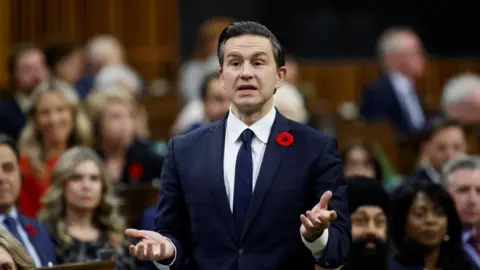ARTICLE AD BOX

 Getty Images
Getty Images
Justin Trudeau, pictured with then-president Donald Trump in 2017, is under pressure to step down as Canada's prime minister
As the US presidential campaign nears the finish line, Canada’s prime minister is facing the threat of a snap election being called at any moment.
Justin Trudeau is under intense pressure to step down as leader after nine years in power. His Liberals have been trailing the Conservative Party by a wide margin in the polls for months.
US Vice-President Kamala Harris, meanwhile, is in a deadlocked race against Donald Trump as she makes the case for why a Democrat deserves another four years in the White House.
A large segment of voters in both countries are feeling a sense of malaise, telling pollsters they think their respective country is moving in the wrong direction.
Nik Nanos, the founder of polling firm Nanos Research, said politics on both sides of the border now shares “common hot button issues”, from the cost of living to immigration.
“What's probably more important is the subtext that the system is broken.”
Darrell Bricker, CEO of Ipsos Global Public Affairs, told the BBC that the message of hope and change that swept Trudeau to victory in 2015 – and the Harris campaign’s early message of joy – aren’t resonating with people struggling to pay their bills.
“Incumbents are really getting punished these days. You saw it in the UK, you saw it in France. And it looks like there's a potential for that to happen in the United States and in Canada,” he said.
Here’s a look at some of the parallels - as well as some key differences.
Inflation and the cost of living
The economy has been key to Trump’s appeal with US voters. “Are you better off than you were four years ago?” the former president asks.
It’s also the biggest headache for Trudeau north of the border, where inflation and higher house and rent prices in particular have been a major problem.
Almost half of Canadians say rising costs have made it hard for them to meet their day-to-day expenses. In the US, more than a third of families say they now struggle to pay for necessities.
Economists point to a range of factors for the painful price spikes of the last few years, including global forces from the war in Ukraine and Covid-snarled supply chains.
But it’s the party in power that tends to get the blame.
Inflation has recently cooled in both countries. US growth has been strong and Canada has begun to make significant interest rate cuts after a series of hikes (the unemployment rate is significantly higher in Canada at 6.5% compared to 4.1% in the US).
Mr Bricker said how voters feel about their own quality of life matters more than the headline figures about the state of the national economy.
“It's really people feeling like everything is getting more expensive and they're not able to keep up with whatever that cost of living is.”
Like Trump, Canada’s Conservative leader has been quick to pounce.
As early as 2021, Pierre Poilievre was sinking his teeth into the Liberals over the pain felt by Canadian families over the economy - promising to "axe the [carbon] tax" - Trudeau’s signature climate policy that he says is driving up household energy costs - and to "build the homes" and "fix the budget".
He hasn’t let go, making the issue a core part of his platform. The latest federal opinion polls give his Conservatives about a 20-point lead over the Liberals.

 Getty Images
Getty Images
Trudeau with Vice-President Harris during a visit to Washington DC in 2021
A 'broken' immigration system
Immigration has become a political problem on both sides of the border. And the Republican and Conservative party leaders have each recognised the power of the issue, including with moderate voters.
Canadians, who have long been tolerant of relatively high numbers of newcomers, have grown concerned that the Trudeau government set ambitious immigration targets in a bid to fill gaps in the country’s economy without adequately considering ripple effects on housing and public services.
One poll indicates that concern over immigration has risen four-fold over the last two years in Canada. It’s been a top issue for Americans as well.
There are sharp differences in the circumstances around immigration in each country.
In the US, a record surge of illegal southern border crossings in recent years has driven the frustration. The overall number of undocumented migrants has since plummeted – in part due to the Biden administration pivoting closer to the approaches Trump took while in office.
In Canada, Trudeau admitted record numbers of immigrants into the country and turned on the tap for foreign students, whose numbers increased from 300,000 in Canada to a million in his time in office.
His government, in a policy about-face, has since slashed the targets for both new permanent residents as well as international students and temporary foreign workers.


The conversation around immigration, however, is quite different.
In the US, there has been a stronger focus on the cultural changes brought by large numbers of migrants, with Mr Bricker pointing to Trump’s comment that immigrants are "poisoning the blood of our country".
In Canada, it's a combination of the pressure on housing and social services alongside the sense that the immigration system “seems to be out of control and not being well managed by the government”, he said.
Poilievre has accused Trudeau of a “last minute pre-election reversal” on the issue.
"He can't fix the immigration system that he broke," he told reporters after Trudeau announced cuts to targets last month, and has suggested linking immigration targets to the housing supply.
A desire for change
The frustrations have led to a sense the electorate on both sides of the border want something different.
In the US, following a disastrous debate in June, Democrats recognised it was unlikely voters would re-elect President Joe Biden. They hope Harris, 60, can convince Americans she’s the so-called “change candidate”.
The 52-year-old Trudeau - once the young, fresh face of progressive politics - is now well into his third mandate.
Polls suggest he is so unpopular that the Liberals face a potential shellacking in the next general election.

 Reuters
Reuters
Conservative leader Pierre Poilievre hopes to become Canada's prime minister at the next general election
Trudeau is also dealing with a revolt from his backbench - but so far he’s rebuffed calls to stand aside so a new leader has a chance to reverse the party’s fortunes.
According to Mr Bricker, the pollster, while Canada has its own internal political and cultural divisions, the ones in the US are a lot sharper.
“The level of vitriol that you see in the United States between the red and the blue states is not the same here, it's not as strong,” he added.
Trump and Poilievre are also different in many respects. Poilievre, 45, is a career politician who comes from modest middle-class means and is something of a policy wonk.
But the two share a talent for communication, are able to speak to voters with pithy, often memorable slogans, and lean into an anti-establishment image.
And neither shy away from the blood sport combativeness of politics, which has made them formidable challengers.

 7 months ago
27
7 months ago
27








 English (US) ·
English (US) ·